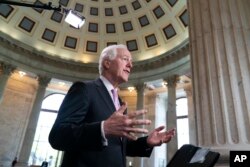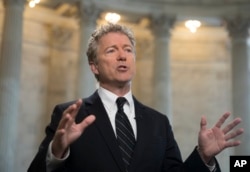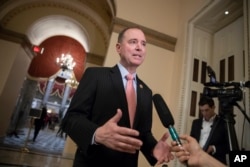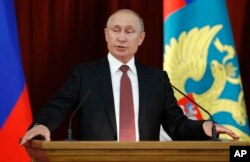U.S. President Donald Trump’s controversial summit with Russian President Vladimir Putin sparked a third day of debate Thursday on Capitol Hill but very little action.
Lawmakers from both sides of the aisle expressed concern about the president’s changing statements on Russian interference in the 2016 election but battled with each other over next steps from calling in the Helsinki translator to testify on the leaders’ closed-door meeting to weighing additional U.S. sanctions against Russia.
Two symbolic measures supporting U.S. intelligence agencies in the face of the president’s shifting pronouncements on the Kremlin’s past and continued threats to U.S. elections failed in the Republican-led Senate.
The chamber’s No. 2 Republican, John Cornyn of Texas, objected to a bipartisan non-binding resolution backing intelligence reports on Russian election meddling and last week’s indictment of 12 Russian intelligence officers. The resolution also urged full congressional examination of Trump’s summit with Putin in Helsinki and called for full implementation of U.S. sanctions against Moscow.
Moments earlier, Kentucky’s Rand Paul objected to a similar Democratic resolution that added support for the special counsel in the Justice Department’s Russia probe, Robert Mueller.
Arizona Republican Jeff Flake, who co-authored the bipartisan resolution, said congressional action is needed after Trump “let down the free world [in Helsinki] by giving aid and comfort to an enemy of democracy” and "dimmed the light of freedom ever so slightly in our own country.”
“We should stand and be counted in defense of our democracy,” said Democratic Senator Chris Coons of Delaware, who crafted the resolution with Flake.
Speaking in support of the Democratic measure, Vermont independent Senator Bernie Sanders said, “If for whatever reason the president of the United States is not going to do what is right, Congress must do it.”
Cornyn argued the bipartisan resolution was unnecessary, saying Trump has corrected statements he made alongside Putin at Monday's news conference in Helsinki.
“In Helsinki, he [Trump] was less than clear about that [Russian election meddling], but he came back and said that he misspoke, and reaffirmed his earlier position that, yes, the Russian government had attempted to interfere in the [2016] election,” Cornyn said. He added, rather than voting on symbolic resolutions, Congress should pass further sanctions to deter Russian malfeasance in the future.
In objecting to the Democratic resolution, Paul accused colleagues of “crazy hatred of the president” and warmongering against Russia.
Senate lawmakers did unanimously pass a symbolic resolution against Russian interrogation of current and former diplomats, just a day after the White House said it was determining “if there was any validity” to Putin’s suggestion Russia could question Americans, including former U.S. Ambassador to Russia Michael McFaul.
Shortly before the Senate vote, White House Press Secretary Sarah Huckabee Sanders said in a statement that while the proposal was made in sincerity by Putin, “President Trump disagrees with it.”
Secretary of State Mike Pompeo told VOA in an interview Thursday, “President Trump was very clear we’re not going to force Americans to go to Russia to be interrogated by the Russians.”
House Democrats’ Helsinki push
Hours earlier, on the other side of the Capitol, Republican representatives blocked a Democratic motion to force the American interpreter at the Trump-Putin summit to testify before the House Intelligence Committee as to what the two leaders said behind closed doors.
The committee’s top Democrat, Adam Schiff, acknowledged the unprecedented nature of the motion, but said it was warranted because Trump “chose to go into that meeting alone. It appears that there were commitments made in that meeting that affect American national security interests.”
Republicans moved to dismiss the motion without comment, and it was tabled by a committee vote of 11-6.
House Democrats also introduced legislation Thursday that if passed would impose new U.S. sanctions on senior Russian political figures and institutions, while strengthening U.S. election infrastructure.
“From one day to the next, the president does not seem to know where he stands on the issue of Russian election interference,” Rep. Jerrold Nadler, the ranking Democrat on the House Judiciary Committee, told reporters. “This bill provides a clear and unambiguous strategy.”
In Russia, meanwhile, Putin put the blame for heightened tensions between Moscow and Washington on Trump’s critics at home.
Putin, in his first public comments on the Helsinki summit, told Russian diplomats, “We see that there are forces in the United States that are prepared to casually sacrifice Russian-U.S. relations, to sacrifice them for their ambitions in the course of an internal political battle in the United States.”
He said it would be “naive to think that the problems" between the world’s biggest nuclear superpowers “would be solved in a few hours.” But he said “the path to positive changes has all the same begun. It’s important that a full-scale meeting has finally taken place allowing us to talk directly. We will see how things develop further.”
For his part, Trump once again defended his performance in Helsinki.
In Twitter remarks, Trump said, “The Summit with Russia was a great success, except with the real enemy of the people, the Fake News Media. I look forward to our second meeting so that we can start implementing some of the many things discussed, including stopping terrorism, security for Israel, nuclear proliferation, cyber attacks, trade, Ukraine, Middle East peace, North Korea and more. There are many answers, some easy and some hard, to these problems...but they can ALL be solved!”
At Monday’s joint news conference, Trump sided with Putin’s denial that Russia had meddled in the 2016 election. The president backtracked a day later, saying he accepts that Russia meddled in the election, but insisted his campaign did not collude with Russian operatives.








